QUETTA: In a bold move to reinforce state authority, Balochistan Chief Minister Mir Sarfaraz Bugti has launched a sweeping crackdown on government employees accused of anti-state activities. During a high-level meeting in Quetta, Bugti issued directives to divisional and deputy commissioners to identify and take stringent action against officials undermining Pakistan’s interests. “No one in public service will be permitted to challenge state policies,” he declared, warning of severe consequences for violators.
The meeting, held earlier this week, also addressed the deteriorating law and order situation and the state of service delivery across Balochistan. Bugti stressed that maintaining security and upholding the government’s writ remain non-negotiable priorities. He ordered district officers to ensure roads remain open and law enforcement is upheld in their jurisdictions. Targeting corruption within security forces, the chief minister vowed zero tolerance for extortion at checkpoints, promising immediate removal for any officer found guilty.
Bugti also took aim at dissent within the ranks, stating that personal opinions must not supersede state directives. “Officers must either comply or resign,” he asserted, signaling a broader push to align public servants with government policies. In a symbolic gesture, he mandated the singing of the national anthem and hoisting of the Pakistani flag in all educational institutions, with heads of non-compliant schools urged to step down.
The chief minister highlighted the need to engage Baloch youth constructively, criticizing efforts to draw them into conflict. With a youth policy already approved, he instructed local officers to prioritize educational and job opportunities to strengthen ties with the state. “Misleading our youth serves no purpose,” Bugti remarked, emphasizing the government’s firm stance against elements challenging its authority.
Meanwhile, the political atmosphere in Balochistan grows increasingly volatile. An FIR has been filed against Dr. Mahrang Baloch, leader of the Baloch Yakjehti Committee (BYC), and several activists, linking them to the deaths of three individuals during a protest in Quetta. The case, invoking the Anti-Terrorism Act among other charges, marks the third legal action against the BYC in the city. Police sources confirmed the details but offered no further comment.
Protests have erupted across the province in response to the arrests of Dr. Mahrang and other BYC leaders. On Sunday, a shutter-down strike gripped cities like Turbat, Mastung, Kalat, Kharan, Chagai, and Panjgur for the second consecutive day. In Turbat, demonstrators staged a sit-in while others blocked the Turbat-Karachi highway, disrupting traffic and trade routes. The unrest underscores deep-seated grievances in the region, with activists demanding the release of detained leaders and an end to what they call state oppression.
As Bugti’s administration doubles down on enforcing discipline and loyalty, the growing protests signal a widening rift. The chief minister’s hardline approach aims to restore order, but the mounting resistance suggests that Balochistan’s challenges—both political and social—may require more than directives from above. For now, the province remains on edge, with the government and its critics locked in a tense standoff.


















































